Earlier this week, @CassSunstein beat the extremely well-beaten drum about academia's partisan imbalance. Suggesting it may be due to discrimination, he worries about the impact of it all on students and faculty research.
Is it true? Is he right to worry?
bloomberg.com/view/articles/…
Is it true? Is he right to worry?
bloomberg.com/view/articles/…
Let's take these one at a time.
1) Is there an imbalance?
Absolutely. Surveying soc sci/humanities disciplinary orgs (n=1700), Klein & Stern (2005) put the D/R ratio at about 8:1. Moreover, panel data has all faculty to the left of their party's median.
researchgate.net/publication/25…
1) Is there an imbalance?
Absolutely. Surveying soc sci/humanities disciplinary orgs (n=1700), Klein & Stern (2005) put the D/R ratio at about 8:1. Moreover, panel data has all faculty to the left of their party's median.
researchgate.net/publication/25…
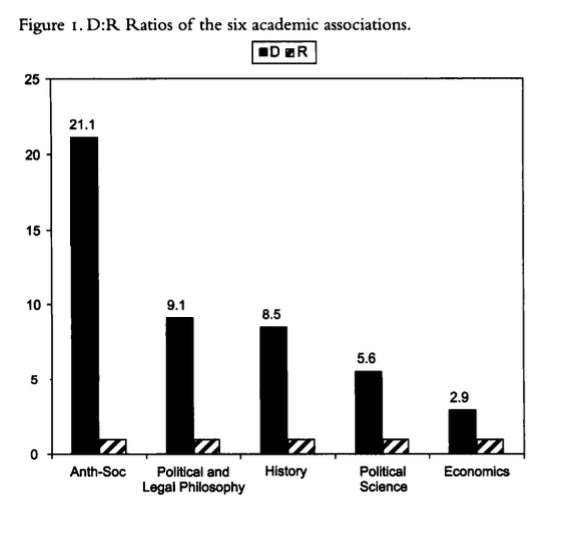
Not good, but there are three problems with this data: 1) It's just soc/humanities; 2) Evidence suggests disciplinary orgs skew left relative to rest of the academy; and 3) Membership in orgs skew toward elite/R1 institutions.
To correct for all this, Zipp and Fenwick (2006) use nationally representative data from 1989 and 1997 to show that the ratio of lib-to-con isn't so bad, and in fact improved (i.e. grew more moderate) during the 1990s.
researchgate.net/publication/24…
researchgate.net/publication/24…
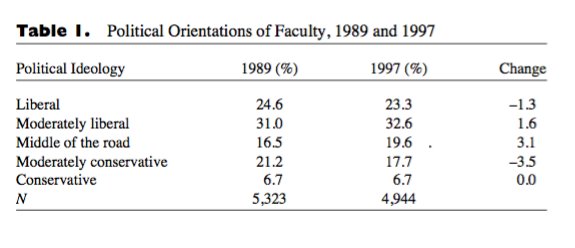
Using more recent data, Gross and Simmons (2007) survey about 1500 full-time faculty at 927 institutions (incl. 4-year and 2-year schools). They find a sizeable moderate bloc and a lib/con ratio of 3:1, but with wide variance depending on the field.
conservativecriminology.com/uploads/5/6/1/…

conservativecriminology.com/uploads/5/6/1/…
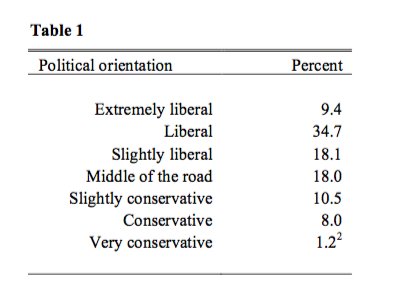
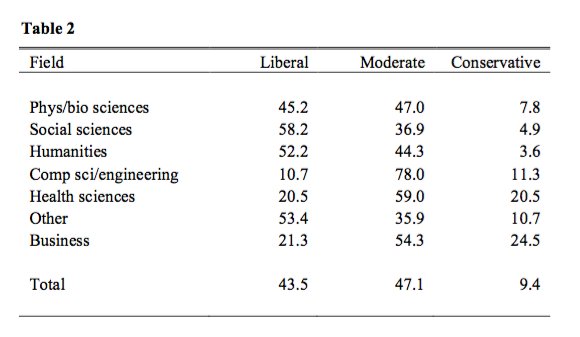
Important to note that D:R and lib:con are not the same thing. Also, faculty cons are much less religious than cons in general and more likely to be libertarians/hawks.
Regardless, at the end of the day, the gap is big. Unclear how big, but it's real. Score one for Sunstein.
Regardless, at the end of the day, the gap is big. Unclear how big, but it's real. Score one for Sunstein.
2) What's the cause?
While Sunstein presents no evidence for discrimination, two studies are highly suggestive. Inbar and Lammers (2012) asked members of a social pysch org whether they would discriminate against conservatives. The #s are upsetting.
yoelinbar.net/papers/politic…
While Sunstein presents no evidence for discrimination, two studies are highly suggestive. Inbar and Lammers (2012) asked members of a social pysch org whether they would discriminate against conservatives. The #s are upsetting.
yoelinbar.net/papers/politic…
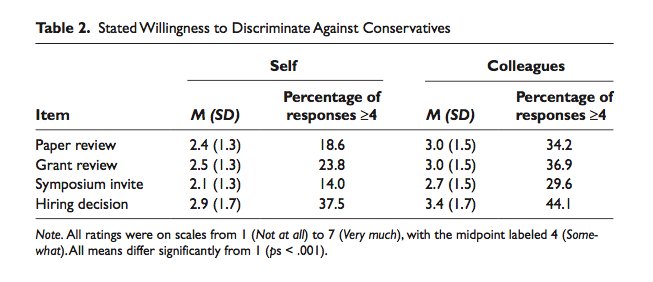
Rothman, et. al. (2005) also say discrimination, pointing to the lower quality institutions that conservatives teach in even after controlling for publication output. Evidence, they say, of a glass ceiling.
conservativecriminology.com/uploads/5/6/1/…
conservativecriminology.com/uploads/5/6/1/…
But I'm skeptical. Woessner and Kelly-Woessner (2009) and Fosse, Gross, and Ma (2014) show no evidence of discrimination at key junctures on the road to faculty employment.
aei.org/publication/th…
scholar.harvard.edu/ethanfosse/pub…
aei.org/publication/th…
scholar.harvard.edu/ethanfosse/pub…
1) Political ideology has minimal to no effect on levels of joint faculty-undergrad research, off-campus meetings, socializing, etc.
and
2) Departmental DGS are just as likely to promptly and positively respond to prospective conservative students as to liberals.


and
2) Departmental DGS are just as likely to promptly and positively respond to prospective conservative students as to liberals.



I feel like I should be tagging some interested parties here. Hey @Noahpinion @jasonintrator @Musa_alGharbi @JonHaidt. I'm doing a thing.
Anyway, the literature is also quite clear that whatever role anti-conservative bias might play in hiring decisions is swamped -- absolutely SWAMPED -- by the role of publications.
[Note to self: I should be writing]
[Note to self: I should be writing]
So while we can't reject the discrimination hypothesis, the evidence is weak. By contrast, the evidence that conservatives self-select out of the academy is very, very strong.
You, a conservative academic: *sputtering with rage*
Me, a liberal hack: Hear me out.
You, a conservative academic: *sputtering with rage*
Me, a liberal hack: Hear me out.
First, con undergrads are much more likely to major in fields that offer non-academic careers (sciences, professional studies, etc.).* Second, they rate much more highly income and starting a family, neither of which fits the academic lifestyle. This is apparent even as freshmen. 


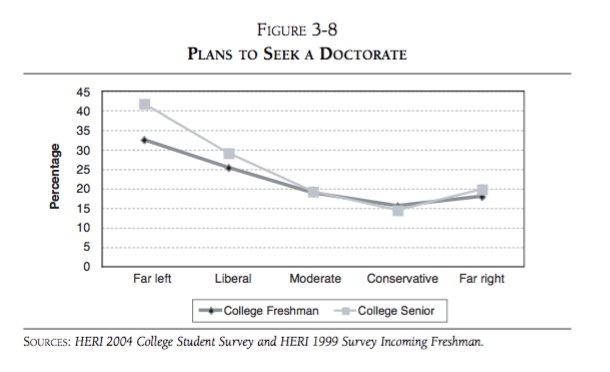
* Yes, I am aware of the endogeneity problem here. Woessner and Kelly-Woessner (2009) have some clever ways of dealing with it.
More speculatively (but, to me, convincingly), Gross 2014 suggests a self-reinforcing cycle: conservatives believe they don't belong in the academy, causing fewer to join, increasing the number who believe they don't belong.
amazon.com/Why-Professors…
amazon.com/Why-Professors…
One thing is for certain: Conservative and liberal seniors report equal levels of satisfaction with their college experience, so we're not seeing a broad mass of angry conservatives driven out of the academy by a bunch of pitchfork-wielding Marxists.
In other words, it's much more likely that self-selection is causing the imbalance than discrimination by advisors or hiring committees.
On this question, I award Sunstein a Gentleman's C.
On this question, I award Sunstein a Gentleman's C.
Wow, this thread is already way too long -- did I mention I should be writing? -- so I'll pause here and start another one in a moment. The question we'll tackle there is whether, given the reality of the D:R split, we should care. In other words, is indoctrination a thing?
• • •
Missing some Tweet in this thread? You can try to
force a refresh




